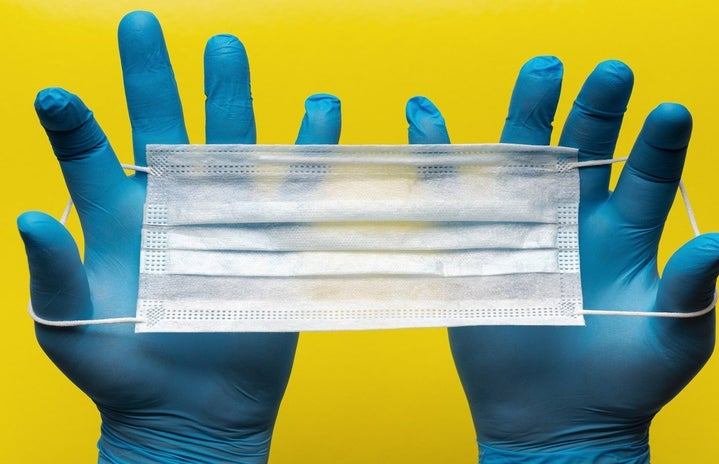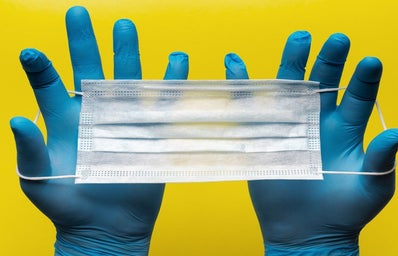This definitely hasn’t been your typical summer. There has been huge devastation across the country due to COVID-19. Today, there have been over 6.7 million cases and nearly 200,000 deaths in the U.S. alone. Throughout this summer, I was an essential healthcare worker as a temperature screener and as a Certified Nursing Assistant (CNA). I’d say the work I did this summer was easily the hardest thing I’ve ever done, but it was still the best decision I’ve ever made.
When I got home from UMass in March after the university shut down, being at home all day completing online classes was really hard, especially since my friends were now scattered across the state and country, as far as California. Even harder than the isolation was watching the news and seeing what horrible conditions essential workers were under, especially in healthcare. I knew that I needed to find a way to help, so as the semester wrapped up, I began my job search. I was certified with an EMT license the summer prior, so I tried to find any way I could contribute with that. I ended up finding both of my jobs in May and began working at them the week after finals.

Working as a temperature screener may sound simple, but it’s not all just sitting around and pressing a button. The hardest thing about this job for me was that it was a twelve-hour shift, 6 a.m. to 6 p.m. Not exactly fun waking up at 4:45 a.m. three days a week. Once I arrived, I allowed the person coming off their shift to go home (yes, someone was there 24/7) and got into my PPE: gloves, goggles, mask, and gown, all on top of scrubs. Some days were great—time passed quickly, people were in good moods, and everything went smoothly. The hardest thing to deal with was people who didn’t want their temperature taken, who would tell you that what you’re doing is pointless and your thermometer does nothing, and having to ask them multiple times to properly wear a mask before entering. It’s difficult to stay calm and polite when someone is disregarding an issue that’s devastating the entire world, but I did what I needed to do with a smile on my face. I stood my ground on why it was necessary for them to follow protocol. Sure, not everybody with a fever has COVID and not every person carrying COVID has a fever, but it’s better to try and catch those that do rather than not take any precaution at all.
My second job, as a nursing home CNA, was by far more emotionally difficult. This was my first job working directly with patients, and with so many different protocols due to COVID, it was definitely a learning experience. I was working with very elderly patients who could no longer perform daily living activities on their own. No two shifts were the same, and no day was ever easy. It was so rewarding to work with these people and get to know them, but the pandemic had a really negative effect on the workforce. Many people were scared to come to work because of the high rates of infection in nursing homes, so we were often understaffed. I was already taking care of patients by myself after about four days worth of training. The PPE was hard to get used to at first: scrubs, a cloth gown, gloves (usually two pairs), an N95, a surgical mask, and a face shield. We had to reuse our N95s, so we would cover them with a surgical mask to try and salvage them for as long as possible. Plus, if you were going into the room of a patient on COVID precautions, you had to put another plastic gown on top of all that.
Trying to make sure I kept my household safe was definitely a little concerning. I totally wish I could’ve just flopped right into my bed after a long day and fell right asleep with my cat. But safety came first! When I got home from my shifts at the nursing home—usually around 12:15 a.m.—I had a whole established sanitizing process to follow. I would wipe down my seat and steering wheel when I got out of the car, sanitize my hands before I went inside, and immediately put my used scrubs into the wash. I’d wipe down my phone and water bottle, take a quick shower, and finally be in bed about 1 a.m. (yes, with my cat.) That was always a great feeling on a Friday night, knowing I’d get to sleep in. But Saturday night it was bed by 9 p.m. and back to Boston for 6 a.m. the next morning.
Oh boy. Just reliving all that through this writing made me tired! It was a hectic summer. Even though I don’t think I’ve ever been as tired as I was during those months, I got to meet people who have changed my life forever and get invaluable work experience during a completely unprecedented time for healthcare. The work I was doing was definitely scary, but knowing how much I was helping with a problem affecting the entire world was so rewarding. I’d do it all again in a heartbeat.




